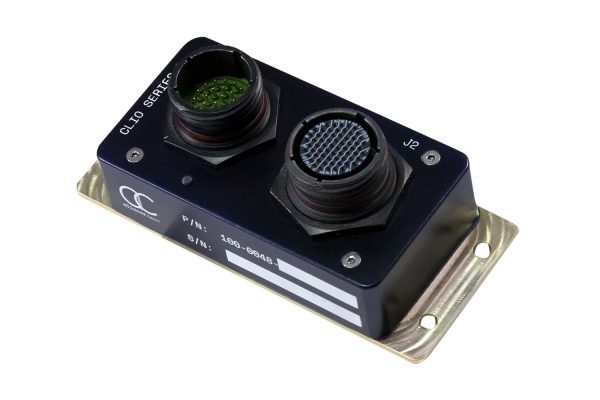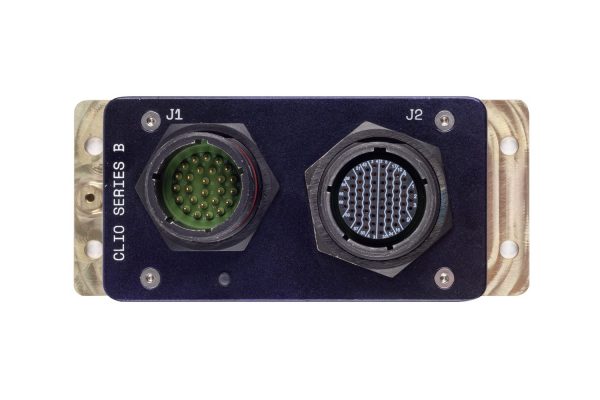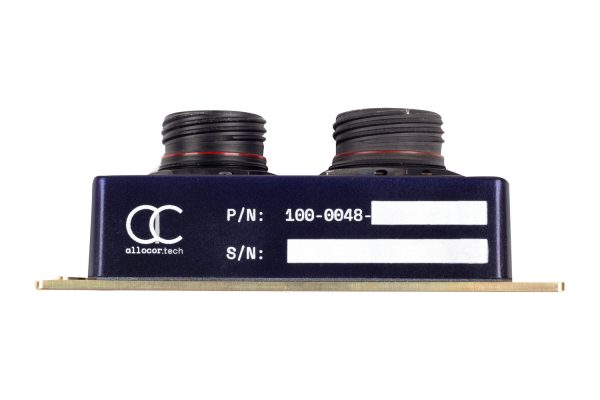The Clio is a computation, communications, and power distribution hub designed to trade off electronics vs harness weight in a hub and spoke system. Depending on client needs the Clio can be just a low power data and power switch, or a high power flight computer.
The Clio Series B is based around a STM32H7 and Xilinx Spartan 7 and normally runs FreeRTOS with lwIP integration. It offers 2 Ethernet and 17 serial ports, 9 switched power outputs and a various GPIO with many customizable options.
In order to leverage the Clio Series B, users will be provided with allocortech’s board support and application framework so that they can focus only on the customizations they require.
Overview
Clio is outfitted with 2 and 4 wire RS-485, RS-232, 5V TTL, CAN-FD, and 10/100 switched Ethernet in a variety of port mappings. Various serial wire protocols are natively supported, and for ports connected to the FPGA coprocessor many more are possible. Of special note are ports that can be used as Remote Control receiver, PWM, safety termination inputs and PWM outputs.
Clio features 4 independent power inputs which can be fed to 3 independent power distribution busses. One of these busses can also be powered from an internal, adjustable 3.5A power supply for even more flexibility. These distribution busses then feed 9 independently switched and e-Fused power outputs.
Functional safety of the Clio can be assured with a comprehensive set of voltage taps, as well as high and low side current measurements on both the inputs and outputs.
Compute Complex
CPU
STMicro STM32H743
400MHz ARM Cortex M-7 with Double Precision Floating Point Unit
2MB Internal Flash
1MB Internal RAM
FPGA Communications Coprocessor
Xilinx S725 or S750 FPGA
Attached over 8 bit parallel bus
External Storage
16 or 32MB Quad SPI Attached EEPROM (2MB reserved for FPGA Firmware)
Communication
Serial
15x Half Duplex RS-485
10x CAN-FD
1x RS-232
1x 5V (3.3V Compatible) Invertible TTL
Ports support a variety of fixed or programmable hardware termination, and fixed or programmable duplex control.
Ethernet
2 external 10/100 ports from an internal managed Ethernet switch. Switch supports Auto-MDIX, VLANs, QoS, Rate Limiting, IGMP Snooping, IEEE 1588v2, and Cable Diagnostics.
GPIO
3x Isolated 50V/3A Solid State Relay Outputs
2x Isolated 50V/3mA Max Constant Current Inputs
10x 3.3V PWM or GPIO
Analog
2x +/-2.5V differential inputs with programmable gain
E-Stop or Flight Termination
Voltage or Current Mode, Monitored by FPGA with Programmable Reaction
Physical
Weight
Aluminum: 325g
Composite: 285g
Dimensions
Length: 5.5 inches
Width: 2.4 inches
Height: 2.0 inches
Mounting
4x 0.22″ diameter mounting holes
1x counter sunk electrical bonding stud
Custom base plates for mounting and electrical bonding are possible.
Power
Input Voltage
12 ~ 50V typical
extended range options available
Power Consumption
Less than 3.5 Watts typical
Power Distribution
3.5A Buck SMPS, Voltage controlled by processor (can feed 2 outputs)
9x 3.5A processor switched and e-fused outputs
1x 200mA 5V auxiliary output
Power is distributed on 3 internal power rails that can optionally be diode OR’d together.
Enviornmental
allocortech products are designed to meet, but not necessarily formally qualified to, various DO-160 criteria. For more information, including any test lab certification, please contact us.
Ingress
IP64
Temperature
Operating: -40 to +70°C
Storage: -50 to +85°C
Vibration
DO-160G Category R
Altitude
-5k ~ 40k Feet Mean Sea Level
Corrosion
Chromate passivized aluminum enclosure, 168+ hours salt fog resistance.
Black zinc nickel coated connectors, 500+ hours salt fog resistance.
Expansion and Debug
Internal Card
Additional daughter cards are supported via a mezzanine connector from the logic board. Supported communications to the processor are bidirectional UART, SPI, and GPIO.
Through Enclosure
SMA sized connector (RF or pneumatic) through enclosure and internal printed circuit boards.
Programming and Verification
Chained JTAG to processor and FPGA
ARM parallel trace port to processor
Document Number
Title
601-0048-001
100-0049-101
allocortech has many supported custom configurations of the Clio Series B that can be created upon request. For cross reference purposes, these are the variants in circulation.
The part number tool (601-0048-001) available on the documentation tab is a useful resource to encode and decode these part numbers to the capability matrix described in the interface control document.
- 100-0048-001 —
DRRAVPPPPP7SBFF00A
- 100-0048-002 —
3RRAVPPPPP6SBFF00A+AUXB
- 100-0048-003 —
0RRAVPPPPP6SBFF00A
- 100-0048-004 —
3RRAVPPPPP6NBFF00A
- 100-0048-005 —
FRRAVPPPPP6NBFF00A
- 100-0048-006 —
FRRAVPPPPP6NFFF33A
- 100-0048-007 —
DRRAVPPPPP6SBFF00A
- 100-0048-008 —
0RAAVPPPPP0N80000A
- 100-0048-009 —
FRRAVPPPPP6NAFE36A
(-211 equivilant; 8A fuses and connector board modified)
- 100-0048-101 —
DRRAVPPPPP7SBFF00A
(Mark II)
- 100-0048-109 —
DRRAVPPPPP6SBFF00A
(Mark II)
- 100-0048-110 —
3FRCVPPPPP0N83F11A
(Mark II)
- 100-0048-112 —
DRRAVPPPPP6S00000A
(Mark II)
- 100-0048-211 —
FRRAVPPPPP6NFFF33A
(Mark III, 8A Fast fuses on load channels 0, 1, 2, 3)




